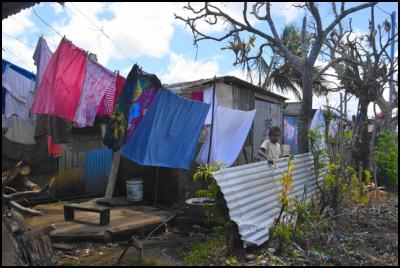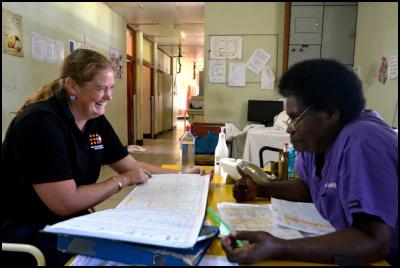Midwives fight Cyclone Pam fear for gift of life
Midwives fight Cyclone Pam fear for gift of life
Date: 25/03/2015
Anne Kalo is a delightful lover of life, punctuating her description of birthing four babies including twins and one by emergency cesarean as Cyclone Pam bore down on the flooded Maternity Ward of the Port Vila Central Hospital in the Pacific island nation of Vanuatu, with short nervous giggles.

Ms Kalo began her shift at 3pm of March 13 and did not go home until 11am Saturday "because no one turned up so we just continued working"; her enthusiasm and general happy-to-be-alive disposition belies the fatigue that a week-long, 12-hour-shift work schedule is bound to give you.
Through the howling winds and rattling windows, her skeletal staff of one other midwife and a registered nurse patiently guided the laboring mothers from one corner to another as water gushed through the ward.
"This whole
place was flooded - the whole ward got flooded so we moved
the mothers into the theatre and then we would move them
around, they just sit on the beds and hold their babies," Ms
Kalo said.
"It was loud and this window kept opening
wide. I was afraid but you just work because everything is
for them (the mothers); you don't panic and their husbands
was helping us move them around.
"I laugh now yes but the
wind was so strong and loud, scary and so much rain; there
was no power so we had to use torch to deliver the
babies."
Between deliveries, the nurses would take up
their brooms and try to sweep the water out of the Maternity
Ward; premature babies and those who needed to be in
incubators had been relocated to a conference room in the
newest building of the hospital.
"I name the baby
delivered by cesarean Pamela," she says gleefully.
The
United Nations response in the aftermath of Cyclone Pam is
coordinated by the United Nations Office for the
Coordination of the Humanitarian Affairs (OCHA); the United
Nations Population Fund (UNFPA) which has existing
programmes with the Government of Vanuatu has deployed
prepositioned dignity kits which arrived in Vanuatu March
24.
Additional kits to be delivered in the next two weeks
will include rape treatment kits, oral and injectable
contraception sub-kit, clinical delivery assistance
(reusable equipment and drugs and disposable equipment), and
kits for the management of miscarriage and complications of
abortion.
Apart from specific areas of assistance like
the kits, UNFPA has also proposed initiatives in the Flash
Appeal to support emergency reproductive health services
($480,000) and gender-based violence prevention and response
programming ($200,000).
As well on Monday (March 23), the UNFPA convened a meeting with grassroots Vanuatu non-government organizations (NGOs) and agreed on a general framework of collaboration that will drive assistance by and for their communities.

The gathering marked the first time that over 20 community-based NGOs committed to sexual and reproductive health and gender protection converged to plan lifesaving responses.
UNFPA Pacific Sub-Regional Office Team Leader, Gideon Mael said the meeting was to mobilize critical local partners for a SRH response to Cyclone Pam, and to share information on UNFPA's humanitarian mandate and capacity as a partner.
"The UNFPA has always engaged civil society in its programming and we recognize that their participation was crucial - they know the local context and they have their networks which reach deep into communities all the way to the most vulnerable, and the most resilient," Mr. Mael said.
"The meeting was a dynamic discussion, they all knew what their communities needed and they submitted their priorities and budgets, for action over a three-month period."
The discussion which included the Ministry for Health, National Youth Council and Department of Women, and affiliate organizations of the civil society umbrella body, Vanuatu Association of NGOs (VANGO) revolved around four main areas: Sexual Reproductive Health in Emergencies, Adolescence Sexual Reproductive Health, Gender-Based Violence Prevention and Response and Community-Based Psychosocial First-Aid.
With assessment results now providing more clarity on Vanuatu's national disaster situation, the United Nations Population Fund (UNFPA) team began arriving March 22 with critically-needed maternal health and family planning supplies; further expertise in the area of gender and protection in humanitarian situation, and sexual and reproductive health medical staff will continue to arrive progressively in the next weeks.
One of the strategies discussed was "community conversations" and outreach to pregnant and lactating women and youth.
ENDS


 Burness: At COP16, Indigenous Peoples & Local Communities Await Final Word On Decisions Impacting World’s Most Biodiverse Regions
Burness: At COP16, Indigenous Peoples & Local Communities Await Final Word On Decisions Impacting World’s Most Biodiverse Regions UN News: Deadly Floods In Spain Highlight Need To Cut Greenhouse Gas Emissions
UN News: Deadly Floods In Spain Highlight Need To Cut Greenhouse Gas Emissions Deep Sea Mining Campaign: New Report Exposes Risks In Digital Twin Technology For Deep Sea Mining
Deep Sea Mining Campaign: New Report Exposes Risks In Digital Twin Technology For Deep Sea Mining Pacific Islands Forum Fisheries Agency: Operation Kurukuru - Joint Forces Combat IUU Fishing To Secure Sustainable Fisheries Future
Pacific Islands Forum Fisheries Agency: Operation Kurukuru - Joint Forces Combat IUU Fishing To Secure Sustainable Fisheries Future Save The Children: World More Dangerous Than Ever For Children With Crimes In Conflict At Highest Ever In 2023
Save The Children: World More Dangerous Than Ever For Children With Crimes In Conflict At Highest Ever In 2023 John P. Ruehl, IMI: Which Countries Are On The Brink Of Going Nuclear?
John P. Ruehl, IMI: Which Countries Are On The Brink Of Going Nuclear?